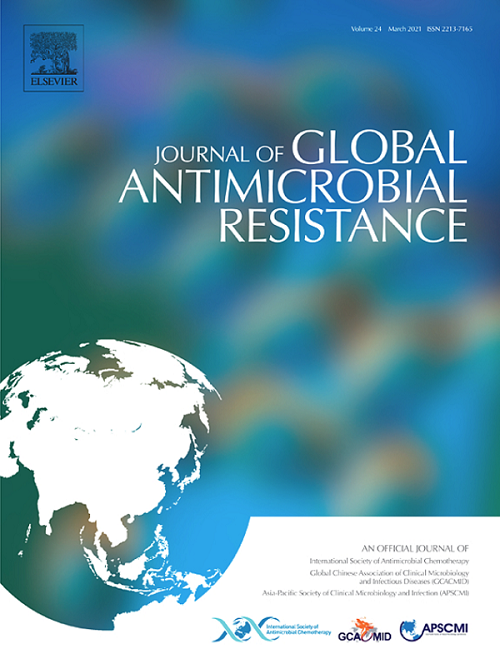Impact of a persuasive antimicrobial stewardship programme on the appropriateness of surgical antimicrobial prophylaxis in a tertiary care hospital in southern Italy
IF 3.7
3区 医学
Q2 INFECTIOUS DISEASES
引用次数: 0
Abstract
Background and aim
The aim of our study was to evaluate the rate of compliance to institutional guidelines on surgical antimicrobial prophylaxis (SAP) among the surgical wards of our facility and to evaluate the impact of our antimicrobial stewardship programme (ASP) on the adherence rate.
Methods
We conducted a cross-sectional study including all 14 surgical wards of our hospital. Eight of these wards participate in a non-restrictive ASP. All patients admitted to one of the wards who had been prescribed SAP were included; the appropriateness of prophylaxis was defined according to the institutional protocols.
Results
During the study period, we evaluated 169 patients undergoing a surgical procedure, of whom 105 (62.1%) received SAP. Overall, 10 (10.5%) patients were prescribed unnecessary prophylaxis; among the remaining 95, 30 (31.6%) received appropriate prophylaxis, while 65 (68.4%) were prescribed SAP deemed inappropriate for one or more reasons (38.5% received a drug with a larger spectrum of activity, 9.2% a molecule with a narrower spectrum, 36.9% an incorrect dose and 76.9% a longer duration of prophylaxis). A higher number of patients in the inappropriate prophylaxis group received abdominal surgery (P = 0.001) and were admitted to a ward not participating in the ASP (P < 0.001). At multivariate analysis, being admitted to an ASP unit was the only factor independently related to having received appropriate prophylaxis.
Conclusions
A low rate of adherence to local guidelines on SAP was observed, but a non-restrictive ASP can significantly impact the appropriateness of surgical prophylaxis.
意大利南部一家三级甲等医院的抗菌药物管理计划对外科抗菌药物预防措施合理性的影响。
背景和目的:我们的研究旨在评估本院外科病房对医院外科抗菌药物预防指南(SAP)的遵守率,并评估我们的抗菌药物管理计划(ASP)对遵守率的影响:我们进行了一项横断面研究,包括本医院的所有 14 个外科病房。其中 8 个病房参加了非限制性 ASP。所有在其中一间病房住院并开具 SAP 处方的患者均被纳入研究范围;预防性治疗的适当性根据机构协议进行定义:在研究期间,我们对 169 名接受外科手术的患者进行了评估,其中 105 人(62.1%)接受了 SAP 治疗。总体而言,10 名患者(10.5%)接受了不必要的预防治疗;在其余 95 名患者中,30 名患者(31.6%)接受了适当的预防治疗,而 65 名患者(68.4%)因一种或多种原因接受了不适当的 SAP 治疗(38.5% 接受了活性谱更大的药物,9.2% 接受了活性谱更小的分子,36.9% 接受了不正确的剂量,76.9% 接受了更长的预防时间)。预防不当组中接受腹部手术(P=0.001)和入住未参加 ASP 的病房的患者人数较多(P结论:观察发现,遵守当地 SAP 指南的比例较低,但非限制性 ASP 可以显著影响手术预防的适当性。
本文章由计算机程序翻译,如有差异,请以英文原文为准。
求助全文
约1分钟内获得全文
求助全文
来源期刊

Journal of global antimicrobial resistance
INFECTIOUS DISEASES-PHARMACOLOGY & PHARMACY
CiteScore
8.70
自引率
2.20%
发文量
285
审稿时长
34 weeks
期刊介绍:
The Journal of Global Antimicrobial Resistance (JGAR) is a quarterly online journal run by an international Editorial Board that focuses on the global spread of antibiotic-resistant microbes.
JGAR is a dedicated journal for all professionals working in research, health care, the environment and animal infection control, aiming to track the resistance threat worldwide and provides a single voice devoted to antimicrobial resistance (AMR).
Featuring peer-reviewed and up to date research articles, reviews, short notes and hot topics JGAR covers the key topics related to antibacterial, antiviral, antifungal and antiparasitic resistance.
 求助内容:
求助内容: 应助结果提醒方式:
应助结果提醒方式:


